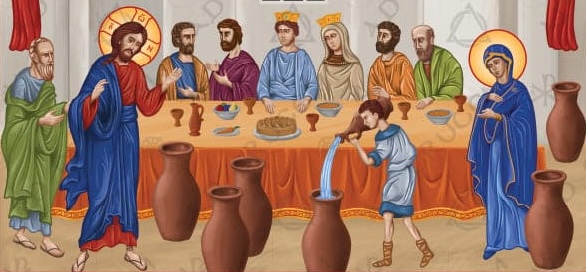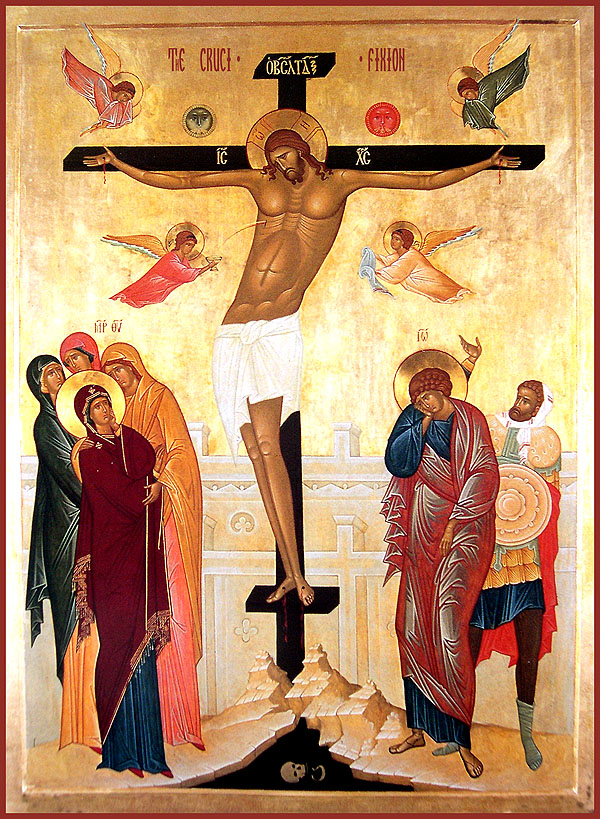
Mark 16:9-20 (Matins)
2 Corinthians 1:21-2:4
Matthew 22:1-14
"Love Marriage"
"The Kingdom of Heaven is like a certain King who arranged a marriage for his Son, ...."
In the Name of the Father and of the Son and of the Holy Ghost.
Amen.
The word king occurs twice in this sentence: kingdom .... king.
Indeed, in the underlying Greek text, only one letter distinguishes these two words from each other:
Basileia, Basilei.
These words are virtually one and the same.
And this unity was understood to bear deep meaning for centuries to come.
In some mysterious sense the king was his kingdom
and
in the Middle Ages and later
was formally addressed
accordingly:
called France or England,
for example
(as we read in Shakespeare).
Even today, the Bishop of Salisbury signs his name simply as +Sarum
and
the Archbishop of Canterbury as +Cantuar,
using the Latin names for these ancient cities.
That is,
the bishop asserts that in some sense he is the gathered ecclesia,
an
association found in a very early and venerated source.
"Where the bishop is there is the Catholic Church,"
wrote the Apostolic Father St. Ignatius
in his Letter to the Smyrnaeans, which was treated
as Scripture
by the Early Church.
And, Jesus is inseparable from the Church as the Body and Head,
as St. Paul teaches.
This doctrine
comes to a perfection in the case of the Kingdom of Heaven,
which is indistinguishable from God in every way.
One does not become a "citizen" of the Kingdom of God.
One becomes united to God,
and this unity of the Holy Trinity with the hosts of Heaven with godly
people everywhere is the Kingdom of Heaven.
Jesus calls this, One-ness (Jn 17:22-23),
simply en in the Greek
—
a word which also suggests being or life,
(the philosophical term is entis),
which signifies our deification,
which we mean by the term salvation.
What does it mean to be saved?
It means we have been deified.
But returning to our sentence ....
what the King does in bringing about the Kingdom of Heaven
is
to arrange the
marriage
of His Son.
We talked about one-ness.
Jesus says that is marriage we are one flesh so they are longer two but one flesh
(Mt 19:5-6),
impossible to separate.
The King's Son is said to be in the Gospels the Bridegroom
(Mk 2:19-20, Mt 9:15, Lu 5:34, Jn 3:29).
Indeed,
St. Paul writes that he is fearful
that Christ will discover upon marrying
the Church that she has not been a chaste virgin (2 Cor 11:23).
That the marriage of the King's Son should be a most serious subject
need hardly be said.
It begins with a King Who obviously signifies God the Father.
He has made a marriage for His Son
—
a clear reference to the Son of God, Whom He has sent into the world.
Into the world for what purpose?
To marry her.
This sending
is the principal reason for which the Gospels were written.
And our lesson concludes in cosmic dimensions,
unto outer darkness,
reminding us that God has sovereignty over all things:
Life, Death, Judgment, Heaven, and Hell.
And what is this business of the wedding guest who has come with the wrong garment?
He has presumed to unity with God,
but he does not have a godly mind.
He has a mind preoccupied with worldly things.
We can imagine, therefore, what his darting thoughts might be.
Now,
marriage is a subject we think we know something about.
But we must not rush headlong into the first century
and
into the midst of ancient Semitic culture,
applying our own knowledge and feelings,
which have nothing to do with first-century marriage.
The marriage we know
—
so-called "love marriage"
—
did not become a widespread institution in the English-speaking world until the nineteenth century.
In fact,
even the consent of the couple did not enter into the marriage contract
until the twelfth century.
That's one thousand years after our story.
Marriage was a social instrument
used for
engineering
the security of a family over future generations.
Alliances among families, thus, were established through marriage.
Ruptures were healed.
Mutually advantageous mergers were effected.
And we note that it was this anxiety for good order
that led to marital monogamy
protected under Roman law.
And while polygamy was known in the Levant, it was rare.
Notably,
kings and princes could not practice polygamy,
for the potential for ruinous confusion,
feuds,
even civil wars were considered too great a hazard.
That is,
the selection of a spouse
—
one person, and one person only,
set for life
—
was a most consequential decision affecting
lifetimes, families, and whole societies.
Even Roman Emperors chose to adopt men as sons
in order to ensure stability and the common good.
Such things were not left to chance
nor to the rash emotions of youth.

Now, it is true
that the arrangements for some marriages
were received as unwelcome news by a bride or a groom.
Yet they understood that greater matters
than the feelings of two people
must be considered
—
an idea that persisted until the mid-twentieth century.
My text is from pop culture:
|
"Ilsa, I'm no good at being noble, but it doesn't take much to see that the problems
of three little people don't amount to a hill of beans in this crazy world. Someday
you'll understand that."
(Casablanca, Script p. 121)
|
We see that
the whole world is at war.
The outcome was far from settled.
In the midst of this
we understand that individuals must sacrifice,
must rally,
must strive.
And individual feeling?
Well, that lacks proportion.
On the personal scale,
a grievous wound threatens two families.
It needs to be bound up.
And
marriage would prove to be the healing balm.
The selfish emotions
of teenagers would have been seen by comparison to verge on
absurdity.
The whole situation must be carefully considered.
Isn't this the way we understand the marriage of Heaven and earth.
Our world was mortally wounded .... unto death,
in need of healing,
and nothing could bind up the gaping wound.
Only a marriage securing alliance with Heaven would do.
Only the Creator in His aspect of Physician (Mt 9:12, Lu 5:31) could be equal
to this transcendent task.

In the ancient world,
marriage meant a change in social status,
either up or down,
for rarely were two families equal.
Inevitably, the marriage of a king (or his heir) could only mean
that the groom must "marry down."
For monarchy means "rule by one."
And all steps in every other direction mean down.
The monarch must condescend.
But if the stooping down of a king is notable,
how much lower must God stoop?
We cannot imagine this incommensurable distance.
We cannot imagine the expansive Glory and high Dignity of God, which must be set aside.
St. Paul wrote that the Son of God emptied Himself,
for we can only really grasp the negative case.
He descended far, far below All-Power, All-Glory, and supreme royalty
assuming the appearance of a slave
in order to enter the tawdry household of man
(Phil 2:7).
That is,
marriage must necessarily be equated to extreme self-sacrifice for Jesus:
no possible personal gain of any kind
and
the most extreme loss imaginable
(as we contemplated on the Feast of Exaltation of the Holy Cross):
a cruel, stifling, and suffocating confinement
that ended only with His death
and
release from the prison of our narrow humanity.
It is highly significant, then,
that Jesus should first reveal His Divine character at a wedding feast in Cana of Galilee.
For here He performed His first miracle of
turning water into wine,
which necessarily pointed ahead to His last miracle,
again
performed at a feast,
where He
turned wine into His Most Precious Blood,
the enduring sign of His sacrificial love for us
pointing ahead to a hill outside Jerusalem:
|
Greater love hath no one than this, than to lay down one's life for his friends.
(Jn 15:13)
|
This marriage to the world ....
we say His "marriage to the Church,"
for the Church is that part of the world that has been faithful ....
This marriage to the world would be celebrated, would be solemnized,
would be consecrated
upon the Holy Cross.
For what is the great difference between
a God Who emptied Himself,
the Suffering Servant,
the All-Holy and Divine God humbling Himself unto earth
and
the Cross?
What is the difference?
What is the difference between a Passion that began at His Conception
and
lasted three decades
and
the sufferings of a few days?
What is the difference?
On the Cross was perfected the terrible privations of this marriage.
On the Cross was put on stark display the neglect and abuse that had been
heaped upon God's Son from the time of His Birth.
On the Cross was no longer hid the enormity of what the world had done
—
and all He endured that the world might be reconciled to Heaven.
No,
His marriage would not be to a comely and chaste bride,
who deferred to His Royal Character.
But it would be a thing of sordid confusion,
of defilement and degradation,
of adulteries and treachery,
and
of common filth.
The Cross
is the place where the twisted world must square with the perfect lineaments of Heaven.
It is a place of unbearable torsion:
where demons cry out,
where oceans boil,
where gales blow.
It is .... the end of the world.
Yet One has been sent as a Bridegroom Who presides over the world's end,
Who banishes demons,
Who stills the winds,
Who calms the seas.
And
He bears with Him the instrument of His intrinsic rectitude:
the Cross with its perfect geometry,
where mercy intersects with justice.
He saves the world with His Life-giving rightness,
this sanity,
this goodness.
Thus,
the Cross endures as the symbol of the most heinous crime humanity is capable of
and
a world that is healed and reconciled to God,
a world this is literally made right
It is the symbol of God's faithfulness to the last
and
of a love that cannot fail.
It is the sign and seal of His marriage.
He is Heaven,
and Heaven is none other than He.
He is the Judge of the world
and
the measure of all things.
He is the Alpha and the Omega.
And He surveys the whole span of human experience
—
every darkness, every depravity, every failure.
And it is His will that all things be made right.
Even at the moment of our greatest crime against Him,
yet He stretches His arms out to embrace His bride
and
to heal her with that fearful geometry which we had designed
as a torture for Him.
In the Name of the Father and of the Son and of the Holy Spirit. Amen.


